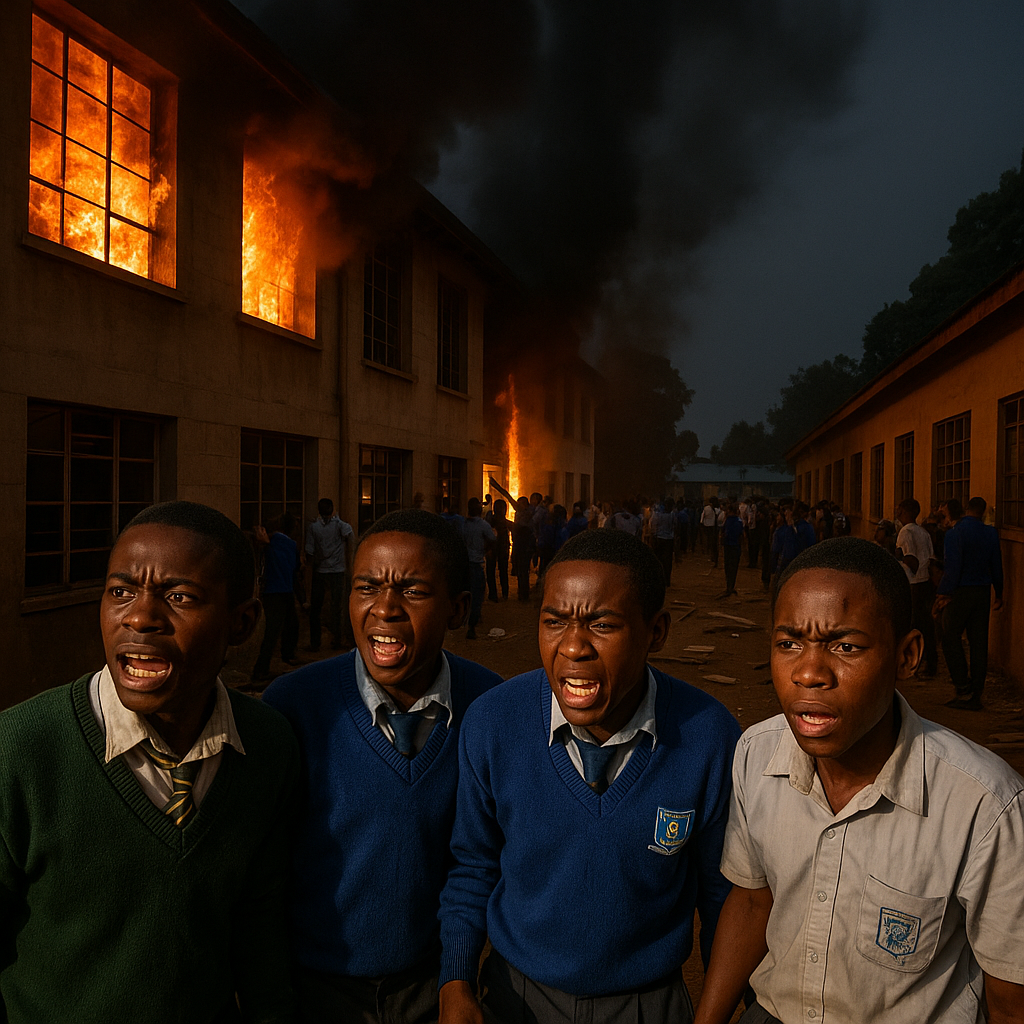A Night of Chaos in Western Kenya
Thank you for reading this post, don't forget to subscribe!In what began as a routine Sunday evening, Mbale Boys High School in Vihiga County, Kenya, descended into chaos on May 26, 2025. The boarding school, renowned for academic excellence and disciplined student life, suddenly found itself in the spotlight—not for stellar grades or a championship win, but for a violent student protest. The cause? Denial of permission to watch the final LaLiga matches of the 2024–2025 season.
This incident has raised eyebrows across Kenya and beyond, shedding light on the intense passion for football among youth, the delicate balance between discipline and freedom in school systems, and the broader question of how institutions should adapt to evolving student interests without compromising order.
The Spark: Denial of a Simple Request
It was the final day of Spain’s elite football league, LaLiga, and millions around the world were glued to their screens as title contenders Real Madrid and FC Barcelona played their deciding matches. Among the excited fans were students at Mbale Boys High School. For weeks, they had anticipated watching the finals—discussing team formations, predicting outcomes, and even organizing viewing groups among themselves.
However, their request to stay up and watch the matches was turned down by the school administration, citing academic focus and the need to maintain routine discipline. The decision, delivered late in the evening, ignited a wave of frustration that quickly turned into anger.
Students who felt disrespected and unheard began to mobilize. What followed was a night of rebellion: dormitory windows were smashed, school property destroyed, and staff members were forced to retreat as the school became a battleground.
Football: More Than Just a Game
To understand why LaLiga finals caused such an emotional eruption, one must grasp the deep cultural and emotional ties that many young Africans—especially students—have with football. Football is more than a game. It’s a passion, an identity, and for some, a dream of a better future.
For Kenyan youth, major European leagues like the English Premier League, LaLiga, and Serie A offer a momentary escape from the pressures of academics, family expectations, and social limitations. Teams like Barcelona and Real Madrid are not just clubs; they are emotional sanctuaries, representing style, resilience, and global success.
Denying the students a chance to participate in such a globally shared experience likely felt like an infringement on their emotional freedom, a disconnection from the world.
The Aftermath: Calm Restored But Questions Linger
In the wake of the destruction, authorities moved swiftly to contain the situation. Police officers were deployed, and the school was temporarily closed to prevent further unrest. Dozens of students were detained and questioned. Parents were called in to assist in mediating the situation.
Fortunately, no lives were lost, and injuries were minimal. However, the damage to school property was extensive, and the psychological toll on students and staff alike cannot be overlooked.
The Vihiga County Education Office, in collaboration with the Ministry of Education, has launched an investigation into the incident. School Principal Mr. Samson Omwoyo described the night as “one of the darkest in the school’s history,” calling for calm and pledging to improve communication between staff and students going forward.
Why LaLiga? The Global Reach of Spanish Football
Unlike the English Premier League, which often takes the lion’s share of attention in East Africa, LaLiga has grown steadily in popularity due to its skillful play, iconic rivalries, and a new wave of African stars. The presence of players from Senegal, Nigeria, and even Kenya in LaLiga clubs has intensified local interest.
In this particular season, the LaLiga title race had been especially dramatic, with Real Madrid chasing their 36th title while Barcelona, rebuilding under a new coach, showed surprising grit and form. The tension, unpredictability, and stakes of the final day had captured imaginations worldwide—including those of Mbale Boys students.
The decision to deny them access to such a culturally and emotionally significant moment added a layer of resentment, especially since many schools had historically allowed such viewings as a reward for good behavior or strong academic performance.
Balancing Discipline and Recreation in Schools
What happened at Mbale Boys High School opens a wider debate on the state of school discipline and student welfare in Kenyan institutions. Schools are primarily places of learning, yes, but they are also social incubators where young people develop their identities, passions, and worldviews.
Denying students the chance to engage in a wholesome, communal event like watching football—even as a regulated privilege—can appear tone-deaf in the modern age. Recreational activities, when integrated thoughtfully, can contribute to better mental health, social bonding, and even improved academic performance.
Kenya’s education sector has faced criticism in recent years for clinging to outdated disciplinary models. The Mbale incident, violent as it was, might serve as a wake-up call that reform is needed—not only in policies but in attitudes toward student engagement.
Voices from the Ground
“I understand the need for rules, but this wasn’t just about football,” said a Form Four student who wished to remain anonymous. “It’s about being listened to. We wanted something that many schools allow. We were not even asking to go out—we just wanted to watch the game.”
Parents, too, expressed mixed feelings. One mother, who picked up her son following the unrest, said, “Yes, what they did was wrong. But maybe if they were heard, it wouldn’t have happened. Schools need to talk to these kids more.”
Teachers and staff, on the other hand, voiced concerns about safety and respect. “We cannot allow students to dictate policy through violence,” one senior teacher noted. “If we give in every time they rebel, what message are we sending?”
Government Response and the Way Forward
Kenya’s Ministry of Education responded swiftly, with Education Cabinet Secretary Ezekiel Machogu condemning the violence but also urging school administrators to be more sensitive to students’ emotional needs.
“We must find a balance between discipline and student engagement,” he said in a press conference. “Our schools cannot become prisons where joy and expression are outlawed.”
Several proposals have since emerged from the education docket, including allowing structured recreational time in boarding schools and reviewing existing co-curricular activity policies. The Teachers Service Commission (TSC) is also reportedly planning to train teachers on emotional intelligence and student communication strategies.
Football as a Catalyst for Change
Could football be the unlikely catalyst for educational reform in Kenya? It’s not far-fetched. Sports have historically been powerful agents of societal change—from the role of rugby in post-apartheid South Africa to football’s use in peacebuilding across war-torn nations.
The Mbale Boys incident, though unfortunate, is a signal that Kenyan youth are ready to engage in the world—not just academically, but socially and emotionally. The key is channeling this energy positively and providing avenues for healthy expression.
Incorporating controlled sports viewership, inter-school leagues, and student-led media projects into school programs could be a start. Schools must evolve to meet the needs of a generation raised on global connection, multimedia influence, and a strong sense of personal identity.
Conclusion: More Than Just a Match
The riots at Mbale Boys High School were not just about a football match—they were a cry for recognition, relevance, and reform. They reflect the growing tension between traditional systems of authority and the modern, connected, expressive youth they seek to govern.
As investigations continue and the school works toward healing and reconstruction, the bigger question remains: will Kenyan schools learn from this? Will they begin to see students not just as academic products, but as human beings with passions, opinions, and emotional needs?
In the end, the students didn’t just want to watch football—they wanted to belong to the world they see on their screens. And perhaps, they wanted to be seen themselves.

